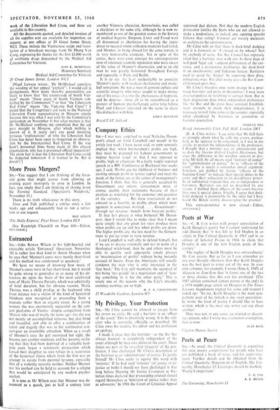Company Ethics
S1R,—I was very surprised to read Nicholas Daven- port's attack on Lord Campbell and myself in his article last week. I have never said, or even remotely implied that 'when businessmen's profits are high. they must be prepared for Labour governments to impose heavier taxes' or that I was opposed to profits, high or otherwise. In a fairly widely reported speech at a BPC Conference at Blackpool two weeks ago, I said, 'Profits are the lifeblood of business and earning enough profit to service capital and meet the needs of the future are at the centre of management's function. I think that this is generally accepted by Government and unions. Government must, of course, qualify their statements because of their position as watchdog for the customer and guardian of the currency. . . But these reservations do not amount to a hostility to profits about which man- agement is sometimes worried. . . . Government— through tax revenue—benefit from buoyant profits.'
If that last phrase is what bothered Mr Daven- port, then 1 would like to make clear that I meant quite simply that any given tax rates produce more when profits are up and less when profits are down. The higher profits are, the less need for the Govern- ment to put -up taxes to raise revenue.
Lord Campbell is well able to defend himself, but if we are to discuss rationally and not in terms of a theological witch-hunt, then he and others must be able to qualify such apparently simple phrases as 'maximisation of profits' without being instantly accused of heresy. Even the Americans will usually condemn the man who is only interested in the 'fast buck.' The City still maintains the standard of not being 'too greedy' in a negotiation and of 'leav- ing something in it for the other party.' This is surely one of the reasons why the City's invisible currency earnings are so high.
H. F. R. CATHERWOOD
25 Woodville Gardens, London W5














































 Previous page
Previous page